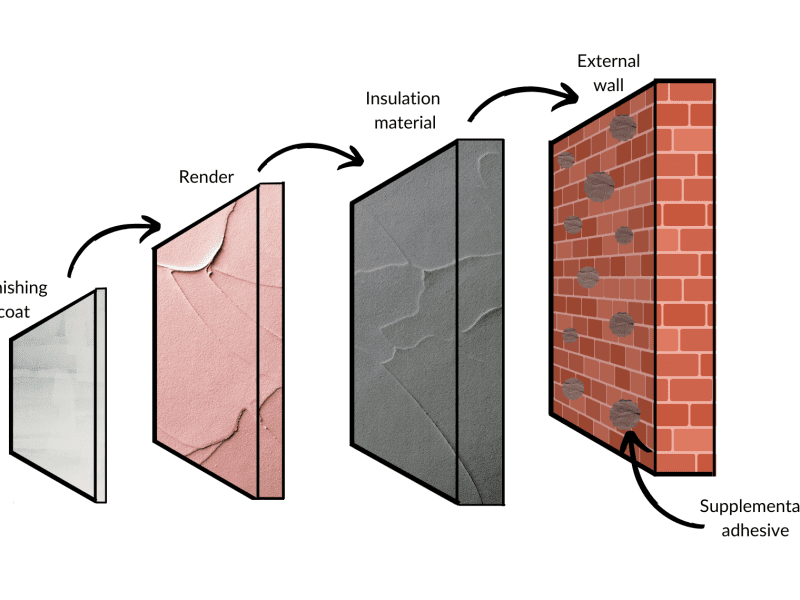
Are you looking for ways to improve the comfort and energy efficiency of your home? Look no further than wall insulation! Adding insulation to your walls can provide a multitude of benefits, from reducing heating and cooling costs to improving indoor air quality. In this blog post, we’ll explore five reasons why wall insulation should be your next home improvement project. Get ready to save money, increase comfort, and enhance the overall value of your property with this simple yet effective upgrade!
Wall Insulation Benefits
There are many benefits to installing wall insulation, both for your home and the environment. Here are just a few:
1. Reduced energy bills: Wall insulation makes your home more energy-efficient by trapping heat within the walls, reducing the amount of energy needed to keep you warm in winter and cool in summer.
2. Increased comfort: Insulation can make your home warmer and more comfortable in cold weather, as well as prevent drafts and moisture build-up.
3. Improved air quality: Wall insulation can help reduce indoor air pollution, which is linked to numerous health problems such as asthma attacks and chronic obstructive pulmonary disease (COPD).
4. Reduced noise levels: Wall insulation can help reduce noise levels in your home, especially during periods of heavy wind or rain.
What is Polyisocyanurate?
Polyisocyanurate is a type of insulation that uses an open-cell structure. This means the insulation is made up of small balls or flakes that are not tightly bound together. This type of insulation offers several benefits over other types of insulation, such as R-value.
One benefit of polyisocyanurate insulation is its R-value. R-value is a measure of thermal resistance and refers to the amount of heat that can be expelled from a material per unit of pressure applied. In general, higher R-values mean more heat resistance. Polyisocyanurate insulation has an R-value of about 7/8, which makes it one of the most heat-resistant types of insulation available.
Another benefit of polyisocyanurate insulation is its sound rating. Sound rating is a measure of how much noise a material will make when struck or bounced against another object. In general, materials with high sound ratings can be difficult to live with because they produce annoying noises when moved or disturbed. The sound rating for polyisocyanurate insulation is about 1/8, which makes it one of the least noisy types of insulation available.
Types of Wall Insulation
There are many different types of wall insulation, each with its own benefits and drawbacks.
One common type of wall insulation is spray foam, which is a material that is sprayed onto the exterior surface of a wall to help keep the building warm in the winter and cool in the summer. Spray foam can be expensive to install, but it can provide long-term thermal benefits and may be less likely to cause moisture damage than other types of wall insulation.
In addition to foam insulation, fibreglass batts are another common type. They are made from a soft, lightweight material that expands when wet. It is easy to install bats and they are often cheaper than spray foam, but they may not offer the same long-term thermal benefits as spray foam, and they may suffer from moisture damage more easily. A type of insulation made from plant fibres called cellulose is preferred by some people.
Pros and Cons of Wall Insulation
1. Wall insulation is a great way to save money on your energy bill.
2. It can help to keep your home warm in the winter and cool in the summer.
3. Wall insulation can also reduce noise levels in your home.
4. It’s an easy home improvement project that you can do yourself.
5. There are a lot of different types available on the market today. So you’ll be able to find something that fits your needs perfectly
.
6. It can be a bit expensive, so be sure to budget for it when you’re planning your home improvement project.
Installation Process
If you’re looking to improve your home’s overall energy efficiency, one of the best ways to do so is by installing wall insulation. Here are three reasons why you should consider doing so:
- Up to 25% of your home’s energy costs can be reduced.
- Heat and cold can cause damage to your home if your walls are not properly insulated.
- You and your family can benefit from wall insulation by living in a comfortable and healthy environment.
Final Thoughts
There are many benefits to installing wall insulation in your home. Here are just a few reasons why you should consider this investment:
- You can save money on your energy bills by insulating your walls.
- You can keep your home warmer in the winter and cooler in the summer.
- Moisture damage can be prevented.
- You can reduce noise levels in your home by insulating your walls.
- Your home’s air quality can be improved.
